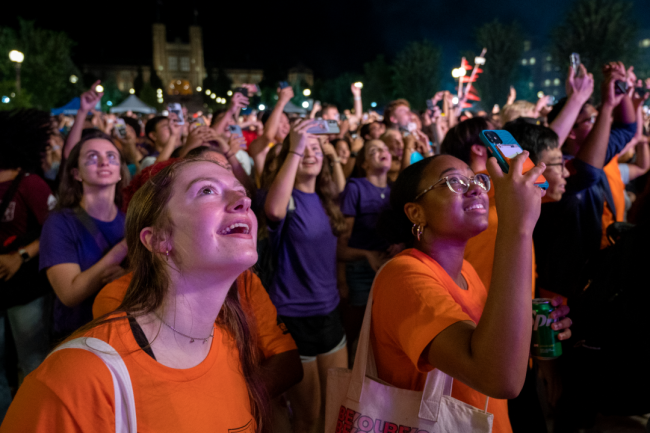You have /5 articles left.
Sign up for a free account or log in.

The Taylor Family Center for Student Success builds on Washington University’s commitment to student success for marginalized students, following its admission of the most economically diverse class in the institution’s history last year.
Washington University
Washington University in St. Louis will launch the Taylor Family Center for Student Success in fall 2023, facilitating resource access and a curated experience for its first-generation and limited-income students.
The center will provide mentorship, financial literacy education and experiential learning opportunities for students, as well as support for families of first-gen students.
The need: Around 1,600, or 20 percent, of WashU’s 8,000 undergraduate students are limited-income or first-generation students.
“In the past, we have focused on the first year. We have had individual programs that have taken a smaller cohort of students through their time. But this is really to serve the entire community over their four years,” says Mark Kamimura-Jiménez, associate vice chancellor for student affairs and dean of the center for diversity and inclusion.
The center: The Taylor Family Center will unite resources for first-generation and limited-income students at WashU and “will really create a pathway into, through and out of the university and into their careers,” Kamimura-Jiménez says.
The center will move from the Women’s Building to the Danforth University Center (DUC), connecting it with other student resources and making it more visible, says Anna Gonzalez, vice chancellor for student affairs.
Andrew Taylor, a WashU emeritus trustee, and his wife, Barbara, gifted $15 million to the university for the center.
That gift joins other donations to support first-generation and limited-income students, such as the Stephanie Brooks Dains and John Dains Student Success Fund, which provides money for emergencies and educational enrichment expenses.
Additional supports: Another feature the Taylor Family Center will explore is what Kamimura-Jiménez is nicknaming “accelerators and boosters”—supports that accelerate a student into the next phase in their education and a boost that gets them through the summer.
“A lot of times, this is happening through ad hoc conversations,” Kaminura-Jiménez explains. “We’re trying to institutionalize programmatic opportunities that really make that path more seamless for students.”
Additionally, the center will support its first-generation families through the Forward Families Program, which will introduce families to campus life, give an orientation of campus and provide parent mentors.
“In addition to focusing on the student, it is understanding and appreciating they come from families that may not have experienced college or college in the same way … at WashU,” Gonzalez explains.
Student mentorship is a key component of the new center. Prior, they could opt in to a mentorship pairing with a peer, but the new structure pairs them with an older student upon enrollment.
In their later years at WashU, students will be mentored by alumni, local industry leaders, faculty and staff. “They don’t have to necessarily align with your career, but it’s important to have folks who are further along in their career post-undergraduate experiences,” Kaminura-Jiménez says.
With this new approach to mentorship, students can expand their social and cultural capital.
“A key foundation for it is Raj Chetty’s work on friendships and social mobility—the idea that communities from different socioeconomic backgrounds are actually transformed when they have cross-socioeconomic mentorship, relationships and friendships,” explains Gonzalez.
Chetty, College Mobility and WashU
A 2017 report from Opportunity Insights, also led by Chetty, dug into tax records to understand the student population of institutions in the U.S., particularly the parental incomes of students and student earnings after graduation.
WashU had the greatest disparity between its high- and low-income student populations, with 21.7 percent of students’ parental income in the top 1 percent of earners—over $630,000 annually—and 6.1 percent of students’ parents in the bottom 5 percent, earning less than $65,000 a year.
When it came to mobility rates of its students, WashU ranked No. 2168, with only 4.3 percent reaching social mobility, as defined by a student starting in a lower-income family and ending in a higher-income family.
The center doesn’t have its mentor roster firmly established, but it plans to draw from its network across campus, like the advancement team and the first-gen network of faculty, administrators and staff.
The impact: Through the Taylor Family Center and other initiatives, WashU leadership is hoping to create institutional change in becoming a “first-generation–ready university,” Gonzalez says. “A lot of the research that’s been done really talks about us focusing in on institutional process, policy change, making sure we are ready for the students that are here.”
Success for a limited-income or first-generation student can have generational consequences and influence on the pathways to, in and through higher education, Kaminura-Jiménez says.
“For us, that successful factor to build intergenerational commitments to higher education to transform their communities … is a huge undertaking,” Gonzalez adds.
Gearing up: The center won’t launch officially until the fall, but preparation is underway.
First on the docket is hiring new staff. “We’re not starting from scratch—we have a director, we have a few staff but, you know, we’re onboarding a whole new team at the same time,” Kaminura-Jiménez says.
Changing locations will also take place over the summer break, and a top priority is keeping students engaged with the new space through the move.
But most importantly, WashU staff members want to understand what students don’t know and where they can support them the most, whether that’s with postgraduate preparation or financial literacy.
Seeking stories from campus leaders, faculty members and staff for our Student Success focus. Share here.




